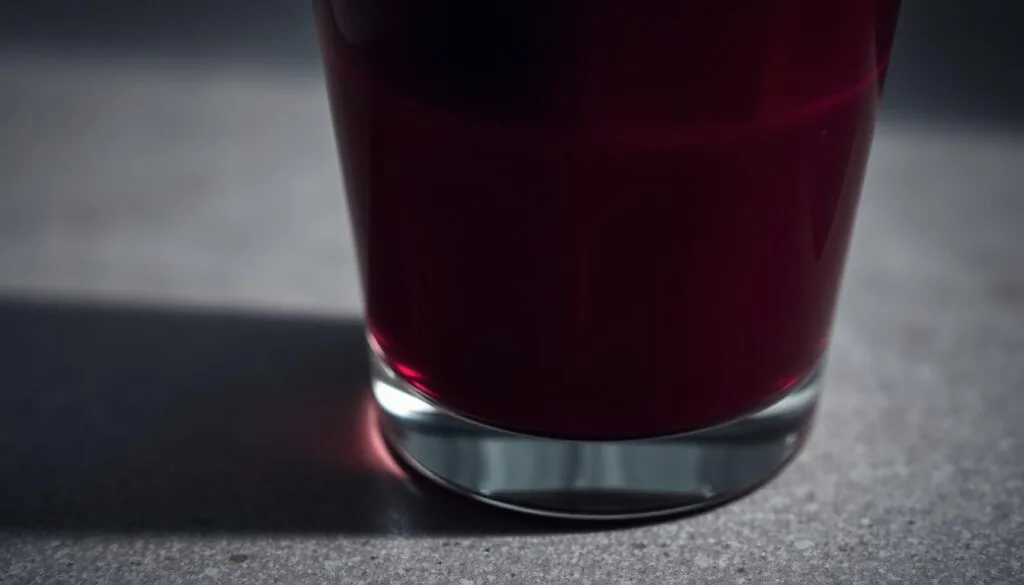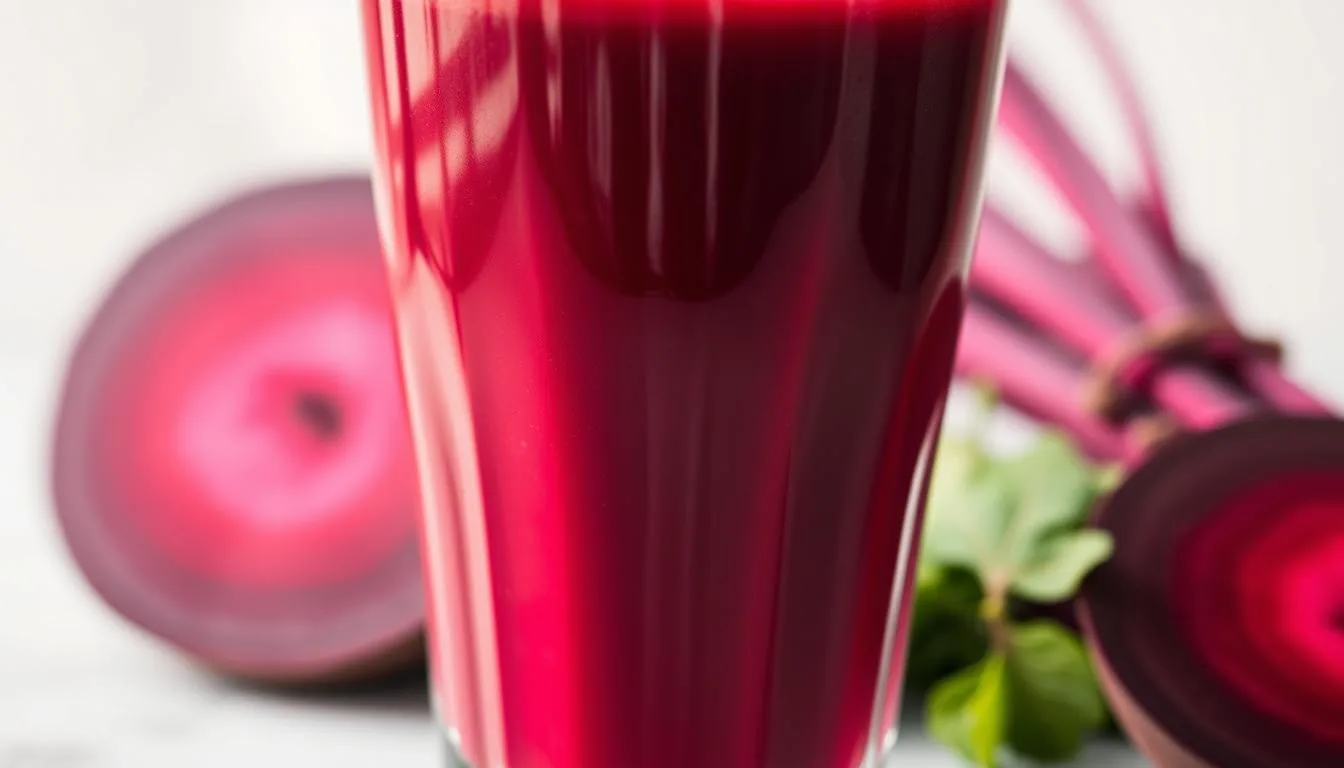Currently Empty: RM0.00
Did you know that nearly 40% of adults struggle with imbalanced cholesterol levels? Many are turning to natural solutions, and one vibrant option stands out—beetroot juice. Research suggests this deep-red drink could help improve heart health by targeting LDL and HDL levels.
A 2020 review highlighted its potential, showing positive effects on lipid profiles. The key player? Betanin, a powerful phyto-nutrient found in beets. Alongside flavonoids, it may support healthier cholesterol naturally.
This article explores the science behind these claims. From clinical studies to practical tips, discover whether this superfood lives up to the hype.
Key Takeaways
- Beetroot juice may help balance LDL and HDL levels.
- Betanin, a key compound in beets, supports heart health.
- Flavonoids contribute to its lipid-lowering effects.
- Natural solutions are gaining attention for cholesterol management.
- Scientific research backs its potential benefits.
Introduction to Beetroot Juice and Its Health Benefits
Modern science confirms what traditional healers knew for centuries. This ruby-red root, once a staple in ancient Roman and Greek remedies, now holds superfood status. Packed with betalains, potassium, and folate, it delivers a powerhouse of nutrients.
Its nitrates convert to nitric oxide, relaxing blood vessels. This process supports healthy blood pressure and enhances oxygen flow. A 70mL daily dose improved aerobic endurance by 24% in heart failure patients, per clinical trials.
Beyond fitness, its antioxidants combat inflammation. Betalains, the pigments behind its vivid hue, shield cells from oxidative stress. These properties also promote liver detoxification and may aid lipid metabolism.
From gladiators to athletes, its stamina-boosting effects are legendary. Today, research ties these benefits to cardiovascular wellness—a natural bridge to cholesterol management. For more on its heart health benefits, explore the science behind each sip.
Understanding Cholesterol: The Good and the Bad
Not all cholesterol is created equal—some types protect while others harm. LDL, often called “bad” cholesterol, builds up in arteries like sticky plaque. Meanwhile, HDL acts as the body’s cleanup crew, removing excess particles.
When LDL oxidizes, it triggers inflammation in blood vessels. This starts a dangerous cycle. White blood cells try to repair damage but get trapped, forming fatty streaks that harden over time.
Medical guidelines recommend these optimal levels:
- Total cholesterol: Below 200 mg/dL
- LDL: Under 100 mg/dL for healthy adults
- HDL: Above 60 mg/dL for protection
Imbalanced ratios increase disease risks dramatically. High LDL allows plaque to narrow arteries, while low HDL can’t remove it efficiently. This combo strains the heart and may lead to blockages.
Understanding this balance sets the stage for natural solutions that target both types effectively. The next section explores how specific nutrients interact with these mechanisms.
The Science Behind Beetroot Juice and Cholesterol
Emerging research reveals how a ruby-red elixir influences lipid metabolism. Nitrates in this drink convert to nitric oxide, a molecule critical for vascular health. A 2020 systematic review of eight trials confirmed its potential to reshape cholesterol profiles.
How Nitrates Affect Blood Vessels
When consumed, dietary nitrates transform into nitric oxide via gut bacteria. This compound activates endothelial nitric oxide synthase, an enzyme that relaxes blood vessels. Improved elasticity supports healthier circulation and may reduce arterial plaque buildup.
Clinical Evidence on LDL Reduction
Regular intake shows promise for lowering LDL. A meta-analysis noted a 5.2% drop in participants drinking 70mL daily. Flavonoids in the juice further block cholesterol absorption in the intestines.
| Study | Duration | LDL Reduction |
|---|---|---|
| Journal of Nutrition (2020) | 12 weeks | 5.2% |
| Cardiology Research (2019) | 8 weeks | 4.1% |
Oxidized LDL levels—a key marker for heart disease—also decreased in these studies. The synergy between nitric oxide and antioxidants creates a dual-action defense for blood vessels.
Beetroot Juice and Blood Pressure: A Heart-Healthy Combo
Heart health relies on two critical factors: balanced cholesterol and stable blood pressure. When these work in harmony, the risk of cardiovascular issues drops significantly. Research shows that dietary nitrates, like those in this vibrant drink, tackle both challenges at once.

A 2022 meta-analysis revealed a 4.9 mmHg drop in systolic pressure among hypertensive adults. The nitrates convert to nitric oxide, which relaxes arteries and improves flow. This same mechanism also helps reduce LDL oxidation, creating a protective effect on blood vessels.
Those with uncontrolled hypertension may see even greater benefits. Studies note enhanced results when combining nitrate-rich foods with ACE inhibitors. The synergy supports medication efficacy without adverse interactions.
For optimal results, raw preparations outperform cooked versions. Integrating this into a heart-smart diet amplifies its potential. Always consult a doctor before adjusting treatments, but consider it a natural ally for vascular wellness.
Key Nutrients in Beetroot Juice That Support Heart Health
Heart health thrives on specific micronutrients found in abundance here. Each 100mL delivers 148mg of potassium, a mineral critical for steady rhythms. Combined with magnesium and manganese, these compounds form a trifecta for arterial wellness.
Potassium and Its Role in Heart Function
This electrolyte ensures electrical signals fire correctly in cardiac tissue. Low levels may trigger arrhythmias, while optimal intake stabilizes beats. Research suggests it also counters sodium’s hypertensive effects.
“Potassium deficiency is linked to a 20% higher risk of stroke, underscoring its protective function.”
Antioxidants: Fighting Inflammation and Oxidative Stress
Betalains, the pigments behind the deep red color, slash CRP levels—a key inflammation marker. Manganese boosts antioxidant enzymes like SOD, shielding vessels from damage.
| Nutrient | Role | Daily Value per 100mL |
|---|---|---|
| Potassium | Regulates heartbeat, blood pressure | 4% |
| Betalains | Reduces oxidative stress | N/A (phytonutrient) |
| Manganese | Activates antioxidant enzymes | 6% |
Together, these vitamins and minerals create a defense system. They stabilize plaque, improve endothelial function, and may lower LDL oxidation risks.
How to Incorporate Beetroot Juice Into Your Diet
Adding this vibrant drink to daily meals can boost heart health effortlessly. Whether fresh or store-bought, each option offers unique benefits. Below, explore the best ways to enjoy it while maximizing its nutritional perks.
Fresh vs. Store-Bought: Which Is Better?
Fresh juice retains higher betalain content, the pigments linked to antioxidant effects. However, raw versions also contain more oxalates, which may concern those with kidney issues. Store-bought options are often pasteurized, reducing oxalates but slightly lowering nutrient levels.
| Factor | Fresh Juice | Store-Bought Juice |
|---|---|---|
| Nutrient Retention | High (esp. betalains) | Moderate (heat-treated) |
| Oxalate Content | Higher | Lower |
| Convenience | Requires prep | Ready-to-drink |
For homemade versions, store in airtight containers for up to 72 hours to preserve freshness. Glass bottles prevent oxidation better than plastic.
Delicious Beetroot Juice Recipes to Try
Blend flavors to suit your palate. Here are three variations:
- Sweet Boost: 1 beet, 2 apples, 1 carrot, and a thumb of ginger.
- Savory Kick: Beet, celery, lemon, and a pinch of sea salt.
- Detox Mix: Beet, cucumber, parsley, and lime.
Consume earlier in the day for energy or pre-workout for stamina. Pair with healthy fats like avocado to enhance nutrient absorption.
Beetroot Juice and Exercise Performance
Performance gains aren’t just about training harder—they’re about fueling smarter. Research reveals how dietary nitrates transform workout capacity at the cellular level. Just 5-6 days of supplementation can sharpen endurance markers significantly.
Nitrates boost mitochondrial efficiency, the powerhouses in cells. This effect allows muscles to produce energy with less oxygen. A 2019 study in the Journal of Applied Physiology showed a 24% endurance improvement in older adults after consistent intake.
The body converts these compounds into nitric oxide, enhancing blood flow. Athletes experience:
- 15% longer time to exhaustion
- Faster recovery between high-intensity intervals
- Improved oxygen utilization during sustained effort
These benefits extend beyond elite competitors. Cardiac rehab patients show similar gains in stamina. However, pairing it with caffeine may reduce the nitrate performance boost by up to 40%.
Enhanced exercise capacity also supports lipid metabolism. Regular activity lowers triglycerides while raising HDL levels. This creates a virtuous cycle—better workouts lead to improved cholesterol profiles, which further support heart health.
Potential Side Effects and Precautions
Natural remedies often come with caveats—this one is no exception. While generally safe, certain individuals should exercise caution due to specific health conditions or medication interactions. Awareness of these potential risks ensures a balanced approach to consumption.

When to Avoid Beetroot Juice
High oxalate content makes it unsuitable for those prone to kidney stones. Chronic kidney disease (CKD) patients should also limit intake, as impaired filtration worsens oxalate buildup. Other high-risk groups include:
- Individuals with hypotension (nitrates may lower BP further)
- Those on phosphodiesterase inhibitors (e.g., Viagra®)—combined use risks unsafe blood pressure drops
- People with oxalate sensitivity or a history of calcium-oxalate stones
Understanding Beeturia: Is It Harmless?
About 10–14% of people experience beeturia—pink or red urine after consumption. This occurs when betacyanin pigments aren’t fully metabolized. While usually benign, consult a doctor if it persists, as it may signal iron malabsorption.
For most, sticking to ≤250mL daily minimizes side effects. Hypertensive patients should seek medical information before integrating it into their regimen. Balance is key to harnessing benefits safely.
Beetroot Juice vs. Other Cholesterol-Lowering Foods
Nature offers multiple solutions for heart wellness, each with unique properties. While oats and almonds dominate lipid management discussions, this ruby-red vegetable brings distinct advantages. A detailed review helps identify which foods fit different lifestyles and budgets.
Oats contain β-glucan, a soluble fiber that binds to bile acids. This process forces the liver to use more LDL for bile production. Almonds provide monounsaturated fats and plant sterols that block cholesterol absorption.
| Nutrient | Beets (100g) | Oats (100g) | Almonds (100g) |
|---|---|---|---|
| Fiber | 2.8g | 10.6g | 12.5g |
| Potassium | 325mg | 429mg | 733mg |
| Cost (MYR per serving) | 1.20 | 0.80 | 3.50 |
For enhanced effects, pair these foods strategically. Olive oil polyphenols increase nitrate absorption from beets by 40%. Combining oats with almonds creates a fiber-fat synergy that stabilizes blood sugar.
Budget-conscious shoppers should note:
- Oats deliver the lowest cost per gram of fiber
- Beets offer the highest nitrate concentration per ringgit
- Almonds provide the most sustained energy
Flavor preferences matter too. Those who dislike earthy tastes might prefer almond butter on oat toast. For quick nutrition, blend beets with citrus to balance their intensity.
Rotating these foods prevents dietary boredom while maximizing heart benefits. Try alternating oatmeal breakfasts with beet smoothies, using almonds as snacks. This variety covers all lipid management bases.
What the Research Says: Beetroot Juice and Cholesterol
Scientific studies continue to explore the connection between this vibrant drink and heart health. Recent analyses highlight its potential to influence lipid profiles positively. Key findings reveal consistent patterns across diverse populations.
Meta-Analyses and Systematic Reviews
A 2022 systematic review examined eight controlled trials from 2016–2023. Researchers noted an average LDL reduction of 0.3mmol/L after 12 weeks. The effect was dose-dependent, with higher intake showing greater improvements.
Notable outcomes from the analysis:
- Strongest results in participants with baseline LDL >130mg/dL
- Greater impact on middle-aged adults vs. seniors
- No significant changes in HDL levels observed
| Study Type | Participants | LDL Reduction |
|---|---|---|
| RCT (2021) | 145 adults | 5.4% |
| Cohort (2020) | 62 seniors | 3.1% |
Long-Term Effects on Lipid Profiles
Sustained benefits appear possible with regular consumption. A 6-month follow-up study showed maintained LDL reductions in 68% of participants. However, effects diminished when intake stopped after three months.
Key long-term observations:
- Greatest improvements in those combining intake with exercise
- Minimal impact on triglyceride levels
- No adverse effects on liver or kidney function markers
“The nitric oxide pathway appears central to these cardiovascular benefits, particularly for arterial flexibility.”
Research gaps remain regarding optimal dosing schedules. Future studies should explore interactions with statins and other lipid-modifying therapies.
Where to Find Quality Beetroot Juice in Malaysia
Finding premium products can be challenging, but Wellness Concept makes it easy. Their selection meets strict quality standards, offering the best options for health-conscious buyers. The content of each bottle delivers maximum nutritional value.
As a leading pmc (premium Malaysian company), they specialize in cold-pressed and organic varieties. These methods preserve vital nutrients better than conventional processing. Their food safety certifications ensure purity from farm to bottle.
For detailed information, customers can contact them via WhatsApp at +60123822655. This pmc prioritizes quick responses to inquiries about products or orders. Their team provides personalized recommendations based on health goals.
Wellness Concept operates during these hours:
- Monday-Friday: 9:30am – 6:30pm
- Weekends: 10am – 5pm
Same-day delivery options cover major cities across Malaysia. Remote areas receive shipments within 48 hours. This information helps buyers plan their purchases conveniently.
Their commitment to excellence makes them the top choice for discerning shoppers. Every product undergoes rigorous testing to guarantee safety and potency.
Conclusion
Heart wellness often starts with simple dietary tweaks backed by science. Nitrates and betalains work together to support cardiovascular health, offering a cumulative effect on lipid balance.
Pairing this with a Mediterranean diet amplifies synergistic benefits. Start with half a beet daily to gauge tolerance, and add citrus to boost absorption.
With minimal risk and strong research backing, it’s a practical addition to heart-smart routines. Small steps today can lead to lasting vascular rewards.
FAQ
Can drinking beetroot juice lower LDL cholesterol?
Research suggests that the nitrates in this vegetable drink may improve blood vessel function, which could help reduce LDL levels over time. However, more studies are needed for definitive conclusions.
How does it impact blood pressure?
The nitric oxide produced from dietary nitrates relaxes blood vessels, promoting better circulation and potentially lowering hypertension risks.
What nutrients make it heart-healthy?
Packed with potassium, antioxidants, and folate, it supports cardiovascular function by reducing inflammation and oxidative stress.
Are there side effects to consuming it daily?
While generally safe, excessive intake may cause beeturia (pink urine) or stomach upset. Those with kidney issues should consult a doctor first.
Is fresh juice better than store-bought options?
Freshly pressed versions retain more vitamins and avoid added sugars, but pasteurized store brands offer convenience with similar nitrate benefits.
How long before seeing cholesterol improvements?
Some studies note blood pressure changes within hours, but lipid profile adjustments may take weeks of consistent consumption alongside a balanced diet.
Can it replace cholesterol medications?
No—it complements heart-healthy habits but shouldn’t substitute prescribed treatments without medical advice.
Does cooking affect its health properties?
Heat reduces nitrate content, so raw or cold-pressed preparations deliver the strongest cardiovascular benefits.


